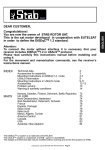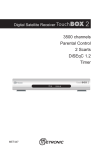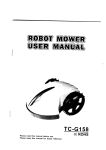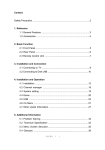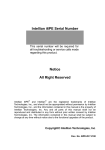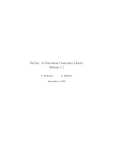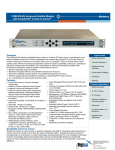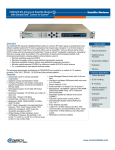Download INSTALLATION GUIDE FOR THE MOTOR
Transcript
INSTALLATION GUIDE FOR THE MOTOR Motor Horizon-Horizon ref 450907 MET445 0 208 994 1181 2 1 A Motorised installation Foreword This user manual will explain to you how to install a motorised installation with a motor ref: 450907. Such installation needs some operations, on the motor, but also on the satellite receiver you intend to use with. As the motor can work with all types of receivers, it is impossible to be precise on the kind of operations that you will have to do on your receiver. We then advise you to read both user manual very carefully (this one and the one from the receiver) to identify what you will have to do on the remote control. That will allow you to do the necessary operations for each unit. These are some small advices to help. Your motor is compliant with all satellite receivers labelled DiSEq 1.2. Furthermore, it is also compliant with receivers featuring the «Goto X» option, witch is also sometimes called USALSTM. USALSTM is a trademark own by STAB. 3 0 208 994 1181 1 - Put the receiver on the reference satellite channel If the receiver is pre programmed, put it on the satellite channel you want. Choose preferably a channel with a high symbol rate (SR), which means greater or equal to 22 000. Diagram 1: reference channel 2 - Go into the DiSEqC 1.2 menu This menu allows you to make the motor turn. Sometimes, to access this menu, it will be necessary to activate the DiSEqC 1.2 function. 3 - Reset the motor It is the reboot of the motor. Sometimes, this function is called Reference position or Zero position. 4 - Continuous rotation Some receivers have 2 methods of rotation: a normal rotation to make the motor turn continuously, and a rotation step by step to sharply adjust the position. If your receiver gives you only one method, consider that it is the continuing rotation. During the rotation, a power and quality indicator indicates the 0 208 994 1181 4 reception level. Note: The size of the level indicator does not have a real importance in itself. What is important it is the variation when you move the dish or the motor. When the level is going up a bit, stop the rotation to check if the quality level increases. 5 - Step by step rotation If your receiver has the step-by-step rotation, you will be able to adjust accurately the motor position. If it is not the case, try to reach as precisely as possible the desired angle with a continuing rotation. It is useful to keep the degree order precision. 6 - Give a number to a satellite Check in your receiver user manual how to associate a number to each satellite. If it is not possible, leave the existing number system. 7 - Store a satellite position This function is generally called memorised, store, saved… 8 - Display the signal indicator Generally, the signal indicator appears when pressing on the INFO key. Sometimes, you have to access the channel search menu. The indicator is often showed as two bars. For the alignment, you need to maximise the signal then, when it is going up, optimise the quality. If the level is high, but the quality is not going up, that means that you are on another satellite, you must continue to scan. The level is always measured on a give channel. So, we will define, for each satellite, a «reference channel» as the channel used to find this satellite. The following table lists a set of reference channels. With time, it is possible that one or more of these channels is no longer broadcast or has its technical data change. If so, choose any other channel of the satellite as a reference channel, provided that the Symbol Rate (SR) is bigger than 22000. 5 0 208 994 1181 B Necessary elements Necessary tools: 11 13 10 12 Note : for the motor itself, only a 13 mm spanner is necessary. Elements: 1 2 3 4 5 6 7 8 9 10 Satellite dish Screw and fixing Offset arm Universal LNB Mast or stand off arm Recommended diameter minimum: 40 mm (1,6’’) Satellite receiver TV set PAL for digital reception and PAL/SECAM for analogue (to be able to watch it in colour) Scart lead male/male 21 pin «F» plug Cable special for satellite, (regular TV cable may not work) 11 Motor 450907 0 208 994 1181 6 1 1 11 2 4 3 5 7 10 8 9 6 7 0 208 994 1181 C Prepare the motor (see diagram 2) Assembling • Make sure the fixing (tube or stand off arm) is stable and strictly vertical. An error bigger than 1 degree (2 cm, or 3/4 inch per meter) from the vertical will preclude the motor for working properly. If necessary, add some block between the wall and the fixing. Check the verticality with a spirit level or a plumb line. • Assemble together the parts of the motor (diagram 2). Put first the U-screws (1) through the part (2). While assembling the part (2) with the body, pay attention to the washer (3) : the part labelled «down» must be placed on the bottom, as shown on the picture. • Once the motor is assembled, do not fix it straight away on the mast or the stand off arm, some operations needs to be done near the receiver first. 0 208 994 1181 8 2 (3) (2) (4) (1) (3) 9 0 208 994 1181 Angle adjustment Look at the Europe map (diagram 3) and find your elevation angle in relation to the horizontal line. For example, about 31,5° for Glasgow, 38° for Bordeaux and 39,5° for Napoli, 34,5° for Brussels. When the right angle as been adjusted, tighten the screws. Be sure to read the angle on the side labelled «ELEVATION», not on the side labelled «LATITUDE» Example for Brussels 0 208 994 1181 10 3 Inclination and angular reading for Hotbird 3 11 0 208 994 1181 D Connection For the installation you will need 2 pieces of cable. The first one, roughly 1,5m (5ft) to go from the LNB to the motor, the second one as long as it takes to go from the motor to the receiver. Prepare the cables and assemble the “F” plug at the end of the cable. Respect the dimension indicated on the diagram 4; the plug must screw on the aluminium foil rolled up on the outer sheath. Make sure that none of the braid strand is in contact with the central core of the cable. Connect the receiver to the television set with a scart lead. Put the motor near the receiver, on a table or on the floor, and connect the receiver LNB input to the Motor RECEIVER output with the 1,5m (5ft) cable, then switch on the receiver. 4 ���� 0 208 994 1181 12 ���� 5 receiver E Reset the motor and checking of the stop The reset of the motor is to reset its position, and put it at 0°, which means face south. Go into the DiSEqC 1.2 (2) menu and then reset the motor (3). • The motor will reset while looking for his reference position. If the motor does not turn, connect the motor to the LNB with the long cable then reset the motor. (2)(3) Go to corresponding paragraph page 4 and 5. 13 0 208 994 1181 F Prepare the motor You will now store the position of Hot Bird then put back the motor precisely at 0° to assemble the satellite dish. 1) Put the receiver on the Hotbird reference channel (1). 2) Give a number to the Hotbird satellite (6) (in any doubt put 4), and then wait that the motor stops turning. 3) Look on the map of Europe (3) and find your Hotbird angular reading in relation to the vertical lines. For example, 18° E in Glasgow, 15° E in Bordeaux, and 2°W in Napoli. 4) Go into the DiSEqC 1.2(2) menu then, with a continuing rotation (4) , bring the motor roughly on the Hotbird azimuth with a step by step rotation (5). Example: London = 14° With the remote control you must make the motor turn until the metallic notch used to read the azimuth reaches 14°. See example on the picture 6. When the arrow is on the right hand side of the 0, the motor turns the dish to the East. 0 208 994 1181 14 (1)(2)(4)(5)(6) Go to corresponding paragraph page 4 and 5 6 Exemple for London 5) Store the Hotbird position (7) 6) Reset (3) the motor to bring it back to the 0° position. 7) Switch off the receiver, take off the cables and then fix the motor on the wall mount or mast. Tighten the screws (4) with such a torque that it doesn’t fall down, but to still allow to turn around the mast. 8) Direct roughly the motor towards the south. In case of an assembling on a wall, make sure the wall faces south (+/- 20%). 9) Link the receiver and the motor with the long wire prepared at the step D. (3)(7) Go to corresponding paragraph page 4 and 5 15 0 208 994 1181 G Satellite dish assembling Assemble the different parts of the satellite dish (see the user manual included with it). H Assemble the satellite dish on the motor • Assemble the satellite dish and fix it on the motor’s stem. The satellite dish U-Bolt must be as low as possible on the stem. As the motor is at 0°, make sure you perfectly align the dish offset arm with the motor (diagram H1). In order to prevent the dish from falling down in case of breakdown of the U-screw of the dish, we advise you to put the security-bolt (marked 4 on the figure page 9). If this bolt is to short to maintain the U-screw, link it to the dish with the help of a strong wire. • Direct approximately the whole set(satellite dish + rotor) towards the south. Adjust the angle on the back support of the dish, so that the dish is vertical. • Switch on the receiver. • Do a continuing rotation (4) until the stop 75° East and 75° West to check if there is no obstacle. If you get close from an obstacle during the rotation, go to paragraph N page 23 to adjust your electronic limits. • Put the receiver on the Hotbird reference channel. 0 208 994 1181 16 (4) Go to corresponding paragraph page 4 and 5 H1 WRONG OK H2 North South 17 0 208 994 1181 I Assembling the LNB head Check the LNB and receiver user manual. J Checking Before going to the final stage (the alignment) check that your installation looks like the picture below (exept the cables). J 0 208 994 1181 18 K Alignment / Satellite dish orientation • At the end of the step K, you will receive the Hotbird reference channel on the television screen. Do not go to step L (adjusting the alignment) if you do not receive this channel. 1) Put the receiver on the Hotbird reference channel then display the signal indicator (8). 2) While checking the level, sweep slowly (for 20 seconds) a quarter of a turn on the right, then a quarter of a turn on the left while pivoting the whole (satellite dish + rotor) around the mast. If the level is not going up, increase the satellite dish incline of 2° and do the same manual scan. Carry on as above by steps of 2° followed by a sweep until the level increase. When you are on the right satellite, the image will appear in the background. Adjust it to obtain the maximum level and quality (bar as long as possible). In some area, it is normal that you will turn up to 20 sweeps, be patient. 3) Block temporally all the nuts. (8) Go to corresponding paragraph page 4 and 5 19 0 208 994 1181 L Orientation adjustment • Put the receiver on the Atlantic Bird 3 reference (1) channel. This satellite doesn’t broadcast popular or interesting channels. However, its position in the sky makes it an interesting one for dish and motor alignment. • Check in diagram the Atlantic Bird 3 angular reading of your geographical area. • Give (6) a satellite number to Atlantic Bird 3 (put 01 in case of hesitation). • If the motor does not stop at the right value, bring it with a continuing research (4) or step by step (5). • Store (7) this position for Atlantic Bird 3. Exemple : Edingburg = 2°W Leave all the menus and check that you correctly receive the Atlantic Bird 3 reference channel (3). If it is not the case, you have 2 cases: First case: You do not receive anything at all, even when you slightly move the satellite dish alignment. In that case, it means that a big error has been made during the installation (mast not vertical, error between east and West, bad reading of the angle…). Restart the installation from scratch while checking each detail very carefully. 0 208 994 1181 20 (2)(3)(4)(5)(6)(7) Go to corresponding paragraph page 4 and 5 Second case: You have a bad reception and you have to adjust slightly the satellite dish position angle (1 or 2 degrees) to receive correctly Atlantic Bird 3. In that case, the design curve of the motor is out of line with the real curve. We then advise you to go back to the step K while putting 2° more for the Hotbird position in your area. If the result is not good, try 2° less. Angular reading for Atlantic Bird 3 21 0 208 994 1181 M Validation of the satellites For each satellite, you have now to storethe right position in the motor. The operation is done for Hotbird and Atlantic Bird 3, you have to do it for Astra, etc. Example for Astra 19° E • Go onto the Astra reference channel. • Go into the DiSEqC 1.2 (2) menu and give a number (6) to Astra 19°E (03 if you hesitate). • By a continuous rotation (4) and then a step by step rotation (5), make the motor turn to obtain the maximum level and quality. • Store (7) the position founded. • Check that you receive the Astra channel. If not, it means that you stored the position of another satellite, which broadcasts some channels at the same frequency. Try the operation above again and make sure that your satellite dish is pointed slightly on the left from Hotbird like shown on the Diagram 17 next page. Do the same operations for the other satellites. When you receive all the satellites, screw definitively all the nuts. Your installation is finished. Note: The Hispasat or Turksat reception with a motorised installation is very difficult and needs a perfect alignment. For the reception of this satellite, we advise a fixed installation, with a particular look at the adjusting of the counter-polarization. 0 208 994 1181 22 (2)(4)(5)(6)(7) Go to corresponding paragraph page 4 and 5 Turksat 17 N Electronic limits Your motor has got mechanical limits that preclude from moving too far east or west (maximum +/- 75 degrees roughly). These mechanical limits are not adjustable. If ever you put the motor in a location where there is a risk for the dish to hit an obstacle, then you must set electronic limit. See the user manual of your satellite receiver for such settings. 23 0 208 994 1181 0 208 994 1181
























